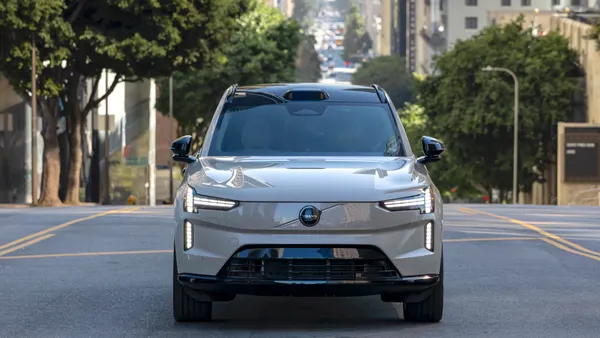Editor's note: This story is part of the WardsAuto digital archive, which may include content that was first published in print, or in different web layouts.
David Strickland, the National Highway Traffic Safety Admin.’s top official, seemed caught off guard when asked what he thought of General Motors’ plan to continue to sell Volts with unmodified battery packs.
“That’s a new development,” he tells reporters in a scrum on the sidelines of the Society of Automotive Analysts meeting a day before the media opening of the North American International Auto Show. “I’ll have to get back to you on that.”
Strickland had just finished a speech highlighting NHTSA’s plans for improving vehicle safety.
Last Thursday, GM announced a fix for its Volt extended-range electric vehicle, which has come under NHTSA scrutiny because of fires caused by the battery pack following crash testing. The auto maker says it will reinforce the battery case, but officials reportedly indicated they would allow dealers to continue to sell the car as is and make repairs later.
Strickland says NHTSA has crash-tested the redesigned pack without incident, but the agency’s investigation remains open.
However, his surprise over learning of GM’s retail plan suggests the auto maker might hear from Strickland before media members do.
I’m OK, You’re OK
“I am very pleased to see the Big Three coming back,” says Laurent Burrell, CEO of French supplier Plastic Omnium as he walks from the Chevrolet exhibit to the Ford stand at Cobo Hall.
A comeback, he says, “is very American.”
Burrell means, in a philosophic way, that it’s good to see the Detroit auto makers thriving. But his company also has a financial interest in their health. Plastic Omnium, for example, makes 1 million fuel tanks annually for Ford.
Kids Don’t Want Cars? GM Economist Isn’t Buying It
There’s been a lot of talk and much has been written about Gen Y’s apparent disinterest in owning new cars.
Consumed with their laptops and smartphones, young consumers prefer to get around via cyberspace and social media, not wheels. They don’t share their parents’ need for personal transportation and would rather spend their money on consumer electronics.
At least that’s the popular theory. But General Motors Chief Economist Mustafa Mohaterem isn’t buying it.
“I keep reading how (young) Americans are more interested in iPads than automobiles,” he tells a gathering of the Society of Automotive Analysts on the eve of the opening of the North American International Auto Show. “But I think that will be proven wrong. At the end of the day, Americans want new cars.”
Mohaterem says the main reason young people aren’t purchasing cars is many don’t have jobs.
“If you don’t have a job, you don’t need a car and you can’t afford a car,” he says. “As the job market improves, car sales will improve.”
Million-Mile Man
As president of GM's sprawling International Operations, Tim Lee already ranked as one of the auto maker's most traveled executives.
Besides monthly visits to Detroit headquarters from his Shanghai office, he also stops often at GM outposts in Russia, Latin America, Australia, India and North Africa, among others.
But in November, the 43-year GM veteran was appointed to the supervisory board of GM's Opel unit in Germany to assist in a revamped restructuring effort, which now finds in him in Western Europe more frequently.
Lee acknowledges having top frequent-flyer status on multiple airlines. "But you know it's gotten really bad when the flight attendants know you by name," he says.










